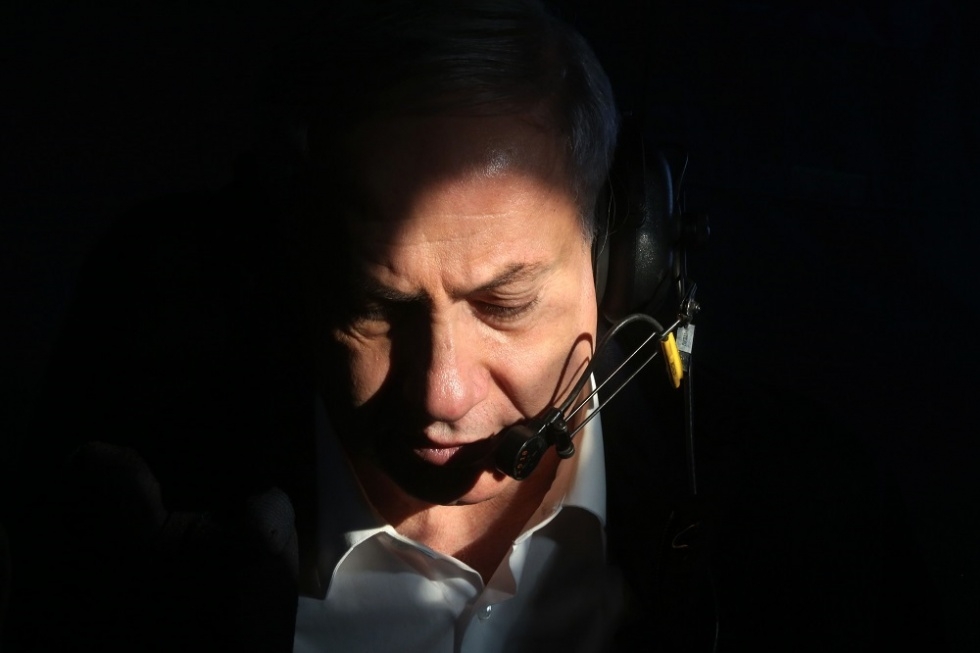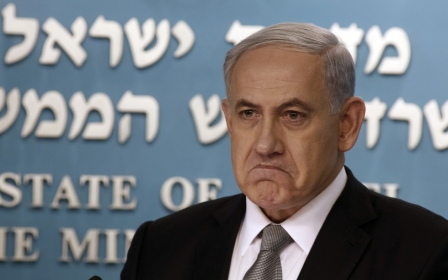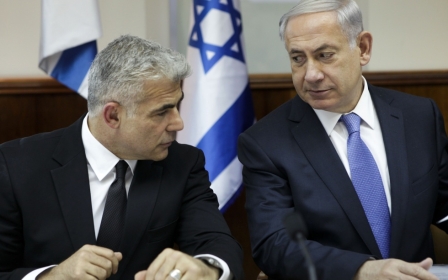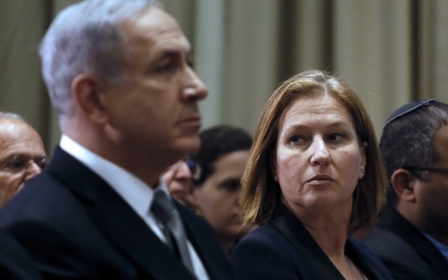Anyone else for Israel, 'just not Bibi'

In December 1998, when the Israeli parliament voted for early elections, the then Prime Minister Binyamin Netanyahu had a lead of more than 10 points over his rival Ehud Barak from the Labor party.
When the polls closed six months later, however, it turned out that Netanyahu lost to Barak by a margin of 12 points. A wave of popular discontent, aimed personally against Netanyahu, swept the left into power.
Fifteen years later, the current Labor chairman Yitzhak Hertzog hopes to get his party, which ruled Israel in its first thirty years, back behind the steering wheel.
His accord with Tzipi Livni, the ex-Justice minister in the outgoing Netanyahu administration Tzipi Livni, to run on a joint ticket in the upcoming parliamentary vote seems to have boosted his chances and he now seems as though he might be able to pull off what until a few weeks ago was seen as an impossible task.
Their common list, unofficially named ‘The Zionist Center’ was announced earlier in the week but by the weekend, the move was already yielding results with opinion polls published this weekend, giving them between 22 to 24 seats, compared to 20 seats for Netanyahu's Likud.
This does not mean that Hertzog's road to the Prime minister's office has been secured. The elections are three months away and the majority in Israel still defines itself as right-leaning. Yet some of the developments which allowed Barak to topple Netantyahu in May 1999 seem to be repeating themselves. Above all, a strong wave of discontent - if not revulsion – about Netanyahu, which can be detected not only among Labor followers, but also among his own voters. "Just not Bibi" [Netanyahu's nickname] is now a phrase heard all over Israel.
Netanyahu was voted into power three times and is only second to David Ben Gurion, Israel's founding father, in the length of his time in office. But he was never truly loved. Born in Jerusalem, he was raised and educated in the US and in many aspects he is foreign to the Israeli mentality. He prefers English to Hebrew and most of his advisers are American-born. For better or for worse, contrary to most Israeli politicians, he does not have close friends or an entourage in a society where people tend to stick to friends from high school or from the military service.
It’s also from the US that Netanyahu imported his deep believes in free market capitalism. While it can be argued to what extent his neo-liberal policies have helped or hindered the Israeli economy, they were certainly met with a considerable amount of resentment in a country founded on collectivist and even socialist ideals.
In the 2006 elections, after the deep cuts he made in welfare benefits during his term as Finance Minister, the Likud under his leadership got 12 seats, an all-time record low.
Instead, Netanyahu's biggest strength is his strong commitment to Israel as the land of the Jews and his reputation for being tough and uncompromising with the Palestinians. "Strong on terror" was his most efficient election slogan. It certainly helped him to get elected in 1996, after a wave of suicide attacks; in 2009 after a disappointing military operation against Hamas in Gaza (Operation Cast Lead); and in 2013 after the quietest years Israelis have known for decades.
But the last war on Gaza was detrimental to Netanyahu's image. Israel did inflict terrible sufferings and huge damage on Gaza, but it was not able to defeat Hamas who kept fighting for fifty days and were able to keep launching rockets on Israeli cities and paralyze the economy.
"In the last ten years we invested 500bn shekels ($125 bn) on the army. Hamas invested 5 bn and the result was a draw," an ex-close aid to Netanyahu said right after the war, representing the popular sentiment in Israel, regardless of political affiliations.
In the months that followed the Gaza war, no rockets were fired at Israel, but the situation stayed extremely tense, with sporadic bursts of violence in Jerusalem, the West Bank and inside sovereign Israel. Netanyahu's main asset was badly hurt. The worsening economic situation and the constant bickering within the government further eroded his popularity. His very decision to dissolve the parliament and call for early elections was generally conceived as rushed and unjustified.
Yet, until recently, it was far from evident that this "just not Bibi" sentiment would bring Hertzog to power. With an exceedingly rich family background, high-pitched voice and a general lack of charisma, he was never considered a serious candidate for the job. But Hertzog, a lawyer and well trained political operator, surprised many.
The deal with Livni was criticized by many because Hertzog agreed to let her replace him after two years in power, if they win the elections. This means that Livni, whose party according to polls barely passed the four seats threshold needed to get into parliament, might end up as prime minister. However, the public seemed to appreciate the swift and efficient way in which Hertzog concluded the deal. Since then, Labor has jumped from 13 to 15 seats to 22 to 24 seats in the polls.
But this is not enough. Hertzog needs a majority of 61 seats in parliament in order to form a government. Even with the leftist Meretz and the parties representing the Arab minority (which may unite into a common list for the first time in Israel's history) he would fall short with about 40 seats.
Nor has the disillusion about Netanyahu started working in Hertzog's favour yet.
Naftaly Bennet of the far right-wing Jewish Home party is also reaping votes among those frustrated from Israel's draw with Hamas in Operation Defensive Edge. Moshe Cahlon, an ex-Likud minister popular for money saving reforms in the cellular market, is similarly receiving support fresh from right-wing electorate more interested in consumer prices than in negotiations with the Palestinians.
Foreign Minister Avigdor Lieberman is another player who stands to benefit. As a Moldova native, he has a strong following among Israel’s more than one million ex-Soviet Union immigrants who are more convinced by his anti-Arab rhetoric than his vague talk about a peace agreement (which according to Lieberman should include a transfer of Arabs from Israel into Palestine).
To the centre of the political spectrum, Hertzog also has to compete with ex-Finance Minister Yair Lapid who remains popular with the urban middle classes that have little sympathy for social democratic ideas in general and the Labor party in particular.
Hertzog, with his Ashkenzi (Jews originated from Europe) looks and unhidden readiness for compromise with the Palestinians, will find it hard to win votes among this electorate. But his deal with Livni did help to position himself as the only serious contender to replace Netanyahu. Benet is too extreme, Lieberman, Cahlon and Lapid are appealing to restricted audiences. Hertzog, whose grandfather was the chief rabbi of Palestine during the British Mandate, has also very close relations with the ultra-orthodox parties which are predicted to have 15 seats in the next parliament.
If the elections would have been held only between right and left, between those looking for a settlement with the Palestinians and those wishing to preserve the status quo or even annex territories in the West Bank, than Netanyahu would be a sure winner. But due to the "just not Bibi" sentiment and the general disintegration of the Israeli political map, Hertzog may find himself in a position that allows him to form the next government.
True, even if Hertzog wins, his government will be a hybrid at best. It is very doubtful if he will have the courage to include the Arab parties (or party) in government, an act which only the late Prime Minister Yitzhak Rabin dared to do. Right-leaning Cahlon and transfer-loving Lieberman will therefore probably get key positions in his government - not a very promising prospect for the peace process.
Yet contrary to a Netanyahu-Benet coalition, a government led by Hertzog and Livni will try to resume talks with the Palestinians. It may be not much, but it is more than the current stalemate which is only fuelling further violence.
Meron Rapoport is an Israeli journalist and writer, winner of the Napoli International Prize for Journalism for a inquiry about the stealing of olive trees from their Palestinian owners. He is ex-head of the News Department in Haaertz, and now an independent journalist.
The views expressed in this article belong to the author and do not necessarily reflect the editorial policy of Middle East Eye.
Photo Credit: Netanyahu's political future is looking uncertain (AFP)
Middle East Eye propose une couverture et une analyse indépendantes et incomparables du Moyen-Orient, de l’Afrique du Nord et d’autres régions du monde. Pour en savoir plus sur la reprise de ce contenu et les frais qui s’appliquent, veuillez remplir ce formulaire [en anglais]. Pour en savoir plus sur MEE, cliquez ici [en anglais].





